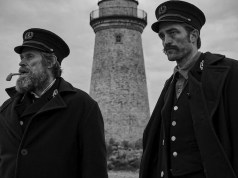
If you’ve seen Yorgos Lanthimos’ other films, like “Dogtooth” or “The Lobster,”** you enter “The Killing of a Sacred Deer” braced for uncomfortable hilarity with touches of deadpan violence. In that respect, Lanthimos does not disappoint. In other respects — say, in the area of providing a lighthearted cinematic experience that you can wholeheartedly recommend to all your friends — he is unsuccessful and not interested.
With regular co-writer Efthymis Filippou, the Greek absurdist here presents what might be his darkest morality play yet. Set in an unnamed American city (filmed in Cincinnati), it involves a heart surgeon, Steven Murphy (Colin Farrell), his ophthalmologist wife, Anna (Nicole Kidman), and their children, teenage Kim (Raffey Cassidy) and younger Bob (Sunny Suljic). But it also concerns a 16-year-old boy named Martin (Barry Keoghan), with whom Steven has some kind of connection, buying him gifts and taking him out for ice cream. We do not immediately understand the nature of Steven’s relationship with Martin — there’s an uneasy feeling as we wonder just what kind of “unsettling” this movie is going to be — but we learn that the boy’s father was a patient of Steven’s and that his mother (Alicia Silverstone) has the hots for the doctor.
Other odd details emerge. The Murphys are a loving, functional family, but their conversations are mundane, their manner detached and clinical. Steven and Anna’s sex life involves one of them pretending to be unconscious, like a patient under anesthesia. Everyone overshares private information and asks strangely personal questions. Martin, a squirrelly, messy kid, ingratiates himself with the Murphys, befriending teenage Kim before finally spelling out his intentions. I won’t spoil them, but if the film’s title means anything to you (it comes from Greek mythology), you may guess where things are headed.
What follows is a perverse “Twilight Zone” scenario about an impossible choice, made grimly funny by everyone’s stilted delivery (as if they’re bored with a very un-boring situation) and Lanthimos’ commitment to his premise. I wish it ended with more flourish instead of simply resolving the plot; on the other hand, Keoghan (recently seen suffering a head injury in “Dunkirk”) gives a performance of remarkable subtlety and creepiness. The film is an audacious, unpredictable provocation that tickles my sensibilities but may offend yours. You’ll know whether the movie’s for you by whether the preceding sentence reads like a warning or an invitation.
**I seem not to have reviewed “Dogtooth” or “The Lobster,” but both are excellent forays into the absurd. “Dogtooth” concerns a family that keeps its children isolated from the rest of the world in hilarious, unsettling ways; “The Lobster” (also starring Colin Farrell) is set in a world where single people are sent to a facility and given 30 days to find a mate or be turned into the animal of their choice. (P.S. Lanthimos also made a film called “Alps,” which I haven’t seen but which proves not all of his titles have animals in them.)
B+ (2 hrs., 1 min.; )





